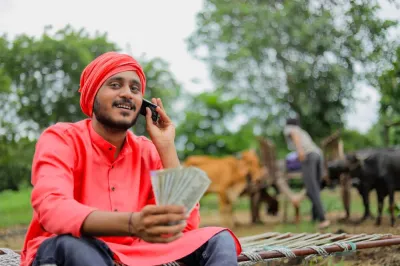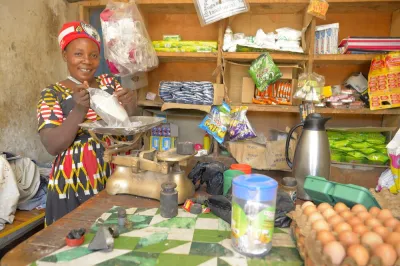FinDev COVID-19 Update | 24 Sep - 07 Oct 2020
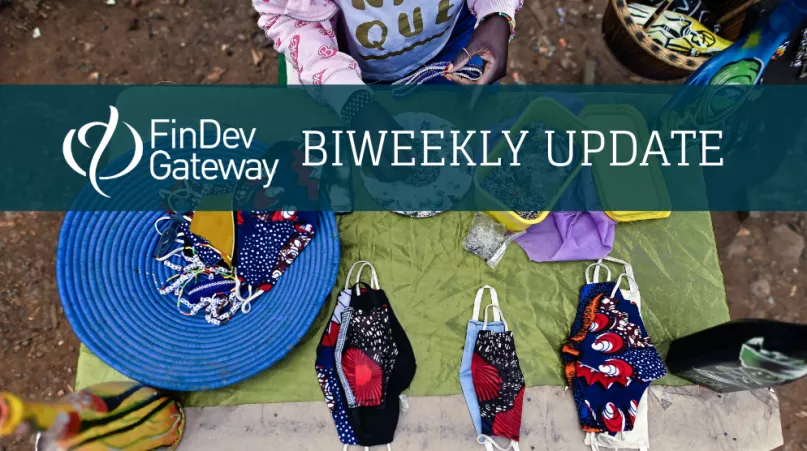
FinDev Gateway has created this COVID-19 Update with the latest and most relevant knowledge resources for financial inclusion. Sign up to receive this update to your inbox.
If you have content to share in our COVID-19 update, please submit here or contact us directly.
Do you find the FinDev Update useful? Take a moment to let us know >>
Global
In the last two weeks, we’ve seen several interesting publications at the global level that examine a range of questions affecting microfinance institutions, SMEs, and fintechs.
- Microfinance: Drawing on the discussions from several workshops organized by CGAP in July, a new CGAP COVID-19 Briefing provides insights on how microfinance providers and their creditors can manage debt restructuring talks effectively; the timely flow of relevant information is one of the key aspects highlighted. Another CGAP COVID-19 Briefing offers five guiding principles for regulating MFIs in ways that mitigate the impacts of COVID-19. The Briefing builds on CGAP’s regulatory framework for MFIs, examines responses in India, Pakistan, Peru and Uganda, and offers additional examples from other countries.
- Small and medium sized enterprises (SMEs): An IMF working paper estimates that without government support, nearly 9 percent of SMEs will fail due to COVID-19; this puts 3.1 percent of private sector jobs at risk. For banks lending to this segment, the estimated impact is moderate as the share of non-performing loans on bank balance sheets represent only 0.3 percent of banks’ assets.
- Fintech: Authors of a new CFI brief say that early-stage fintechs are operationally resilient and are adapting under COVID-19 by taking advantage of new opportunities to create partnerships with banks, governments, and NGOs. They are using digital channels to reach new clients, adapting their product offering, and diversifying their funding base. Accion released a new remote due diligence guide for fintech startups, venture capital firms and other investors, highlighting how providers’ approach to the due diligence process has recently changed and how technology is being used in the process. IFC published a new report highlighting how disruptive technologies are being used in emerging markets to respond to COVID-19; unsurprisingly, the report finds a large digital divide between countries of different income levels.
Asia
- As part of the Vietnamese government’s response to COVID-19, the State Bank of Vietnam has initiated a pilot scheme to develop a mobile money service for the country, prioritizing rural areas over major cities in order to enhance financial inclusion.
- IPA’s RECOVR survey in the Philippines found that 70 percent of respondents had trouble buying the usual amount of food for their family because of lower household income. 53 percent of poorer households did not have access to an account where they could make or receive payments, highlighting the importance of digitization for ongoing cash transfer assistance.
- The latest World Bank East Asia and Pacific Economic Update estimates that the number of people living in poverty in the region will increase by 38 million in 2020 due to COVID-19. This number includes 33 million who would have otherwise escaped poverty, and another 5 million who would be pushed back into poverty.
- According to the Pakistani credit bureau Tasdeeq-Aequitas Information Services, in the first half of 2020, the Pakistan microfinance industry shrank by 0.7 percent in terms of gross loan portfolio and 4.9 percent in terms of active loans.
Africa
- A review of five surveys conducted in Nigeria unveils extensive economic damage in the country due to the COVID-19 restrictions. Despite using financial tools, households are struggling: 55 percent of respondents to a CFI survey said they have missed a loan payment. Another survey conducted by Nigeria’s National Bureau of Statistics shows that most loans taken since mid-March have been informal, with only 9 percent of Nigerian households obtaining loans from banks and MFIs.
- The pandemic has been a catalyst for growth for telecommunications all across Africa, due to central banks easing regulations and governments sending COVID-19 relief packages via mobile money. Telco giants such as MTN and Orange added millions of new customers, recorded jumps in mobile money transactions and are launching new services ahead of time.
- In Rwanda, the mobile money boom has been accompanied by a rise in fraud. To curb the threat, MTN Rwanda has revealed a new strategy introducing a USSD code into the cash withdrawal process.
- According to an IFC study in Guinea, 85 percent of MSMEs experienced cash flow problems due to the pandemic; 80 percent of the respondents have not received government support.
- Mastercard, in partnership with Samsung, Airtel Africa and Asante Financial Services Group, launched a Pay-on-Demand payment platform. Piloting in Uganda, this new platform is expected to enhance and secure digital transactions.
For more on Africa, check out the latest Portail FinDev Biweekly Update in French.
Latin America and the Caribbean
The articles and knowledge resources referenced in this section are in Spanish.
- According to data from the International Labour Organization, 34 million people have lost their jobs in LAC due to COVID-19. A new World Bank report offers three recommendations for stimulating job creation in the region: 1) boost productivity by investing in physical and digital infrastructure; 2) invest in human capital; and 3) rethink the social protection system.
- In Colombia, one in ten microenterprises were forced to close due to the pandemic, according to an August survey conducted by Interactuar, a non-profit social development corporation. Among the main reasons cited for closing were running out of cash to finance operations and a 50 percent reduction in sales. Previous studies have shown that microenterprises in Argentina, Honduras and other countries in LAC closed for similar reasons.
- Out of every ten products sold by SMEs in Mexico, seven are now sold online, and five are sold through the digital platform Mercado Libre, according to a study conducted by the consulting firm Trendsity. This turn to digital sales is also seen in other countries in the region such as Peru, Colombia and Brazil.
- A new law in Peru establishes extraordinary provisions for loan moratoria for individuals and micro and small enterprises. The measures include rescheduling or temporarily freezing unpaid loans, reduced interest rates and credit forgiveness. Several countries in the region, including Ecuador, El Salvador, Bolivia and Mexico have taken similar measures.
For more on LAC, check out the latest Portal FinDev Biweekly Update in Spanish.
Arab World
- The SANAD Fund for MSMEs has provided a $15 million loan to Banque du Caire for on-lending to micro, small, and medium enterprises, agricultural producers, and microfinance institutions in Egypt.
- After postponing customer payments for six months last March, Bab Rizq Jameel Microfinance, part of Community Jameel, extended the program by three additional months until December, in support of efforts to mitigate the pandemic’s impact on Saudi citizens.
- Egypt’s Banque Misr plans to launch a standalone digital bank in the third quarter of 2021 that offers cheaper transactions and focuses on financial inclusion, as the coronavirus pandemic accelerates the government’s push for a cashless society.
- Income levels in Arab countries declined by 11 percent in the second quarter of 2020, “which is a significant decline compared to global levels,” Director-General of the International Labour Organisation Guy Ryder revealed during a high-level event on 30 Sep organized by the G20 Group and the International Monetary Fund.
For more on the Arab world and resources in Arabic, check out the latest FinDev Update in Arabic.
COVID-19 Resources
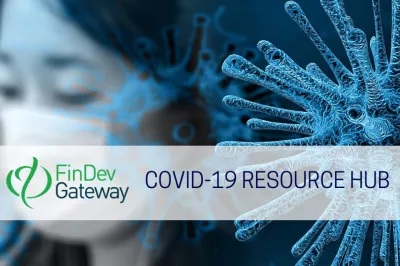
COVID-19 Resource Hub
A collective space for the financial inclusion community to share experiences and lessons learned from the pandemic
FinDev Coronavirus Data Tracker
Data relevant for financial inclusion - find out who is tracking what
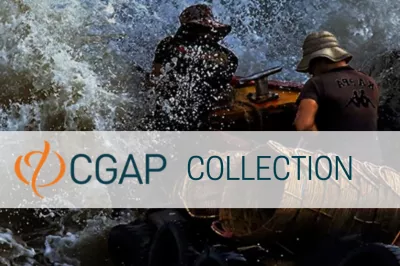
New Data Source
View our complete Data Tracker listing most important sources and trackers by the level of their relevance to the sector.
60_Decibels: Financial Well-being in the face of COVID-19
60 Decibels, in partnership with SPTF and its members, has been speaking to microfinance clients around the world to understand how they are being impacted by COVID-19, and what financial service providers (FSPs) can do to best support them. This live dashboard shares insights from conversations with 2,103 clients from 10 FSPs across eight countries throughout Africa and Asia in July and August 2020.
Recent Publications
Do you have a publication to add to this list? Share your work on FinDev Gateway.
Regulation and Supervision
Guide to Supervision in the COVID-19 World
Toronto Centre | Oct 2020
Microfinance and COVID-19: Principles for Regulatory Response
CGAP | Sep 2020
Investors
Guide to Remote Due Diligence
Accion | Oct 2020
Debt Restructuring in Microfinance
CGAP | Sep 2020
Fintech and Digital Finance
Digitizing for Inclusion: Insights From Wage Digitization in the Garment Sector
Mastercard Center for Inclusive Growth & BSR | Sep 2020
Rapid Innovation: How Fintechs are Adapting Under COVID-19
Center for Financial Inclusion at Accion | Oct 2020
The Impact of COVID-19 on Disruptive Technology Adoption in Emerging Markets
International Finance Corporation | Sep 2020
Socioeconomic Impact
Saving Cash, Saving Lives
CARE | Sep 2020
Navigating Through COVID-19: A Snapshot on How the Pandemic Affected MSMEs in Guinea
International Finance Corporation | Sep 2020
COVID-19 and SME Failures
International Monetary Fund | Sep 2020
View All Publications Related to COVID-19 >
Blogs & Opinion
If you have a blog idea and would like to write for the FinDev Blog, please review our guidelines. We do not cross-post blogs that have been published elsewhere, but if you wish to share an existing blog post in our next FinDev COVID-19 Update, you can send it to us using our contact form.
COVID-19 Responses
Indonesia’s Largest Cash Transfer Program Pivoted Quickly in Response to COVID-19. Can Beneficiaries Keep Up?
07 Oct 2020 | Sophie Theis, Victoria Johnson, Rahmi Yunaningsih, and Elwyn Panggabean | Women’s World Banking
COVID-19 Impact-Recovery Pathways for the Economy: Features and Implications
05 Oct 2020 | Anzetse Were | FSD Kenya
Sustaining Savings Groups Linked to Financial Institutions Amid the COVID-19 Crisis
01 Oct 2020 | Thomas Bariti & Anup Singh | MicroSave Consulting (MSC)
Fintech and Digital Finance
Can Agile Fintech Startups Be the Answer To Food Insecurity During the COVID-19 Crisis?
28 Sep 2020 | Malika Anand & Michelle Hassan | NextBillion
Maintaining a Critical Link to Last-Mile Customers: Challenges and Opportunities Facing Financial Service Agents During COVID-19
24 Sep 2020 | Nisha Singh & James Robinson | NextBillion
Socioeconomic Impact - Gender
Women and Youth May Be Weathering COVID Better Than Others, but the Most Vulnerable Are Getting Left Behind
06 Oct 2020 | Malika Anand | BFA Global
Gender: The Blind Spot of the COVID-19 Response in Low- and Middle-Income Countries
05 Oct 2020 | Aakash Mehrotra, Rahul Chatterjee, Saloni Tandon & Sonal Jaitly | NextBillion
Socioeconomic Impact - Country Surveys
Using Evidence to Inform Social Policy in the Philippines in the Time of COVID-19: RECOVR Survey Reveals Priorities for Economic Recovery
28 Sep 2020 | Mariel Bayangos, Raquel Celeste, Karisha Anne Cruz, Luciana Debenedetti, Shahana Hirji, and Nassreena Sampaco-Baddiri | Innovations for Poverty Action (IPA)
Nigerians Are in Desperate Need of Relief as COVID-19 Reduces Wealth and Stresses Coping Strategies
24 Sep 2020 | Eric Noggle & Madeleine Longwell | CFI-Accion
Human Resources
Functioning Remotely: Digital Tools & the Human Factor
25 Sep 2020 | Sahana Arun Kumar | Boulder Institute of Microfinance
Webinars and Events
EMN Annual Conference 2020
13 - 15 Oct 2020 | European Microfinance Network
Microfinance Plus: Investing Beyond Traditional MFIs
15 Oct 2020 | ADA
View All Upcoming Events Related to COVID-19 >
News
Fintech Will Lead the Charge in the Post-COVID-19 Recovery
| Fintech Magazine | Global
Remittances in the Time of Pandemic
| Financial Times | Global
View All News Related to COVID-19 >
Quick Links:
FinDev Guide
About this guide
Published
Topics
Contributed by a global financial inclusion community member. Share your lessons learned
Write for usLeave a Comment
Comments on this page are moderated by FinDev Editors. We welcome comments that offer remarks and insights that are relevant to the post. Learn More
